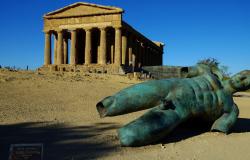Stage number 7, from Foligno to Perugia, 38.5 km to be done in freediving. The time trial that will direct in one way or another the Giro d’Italia of almost all the big favourites. Once finished, in fact, the runners and teams will know whether in the following days they will be able to run in a slightly more defensive and careful manner, or will have to adopt an attacking mode, to recover the ground lost against the clock.
A fast time trial, suitable for great specialists, up to km 32, when you reach the Ponte Valleceppi area. From there, for 6.5 km, the road will climb steadily up to Perugia, giving riders less accustomed to long-range straights the chance to overturn the verdict. In particular, it is the first 1500 meters of the climb, up to Casaglia, that are frightening, with double-digit gradients that could send more than one person into overdrive, especially slightly heavier riders. After that the slope is rather irregular, with almost flat stretches that alternate with sudden surges, for an ending that remains to be interpreted. As always in these cases, it cannot be ruled out that someone might opt to change bikes, using a road one to tackle the last very treacherous ramps.
One of the memories of Alfonsina Strada is linked to Perugia – the first woman to compete in men’s cycling races, as well as one of the pioneers of equalization between men’s and women’s sports – who exactly 100 years ago, in 1924, experienced a very difficult day in the only Giro d ‘Italy that ran, ending up the victim of numerous misadventures that forced it to reach the finish line outside the maximum time, almost 4 hours after the winner Giuseppe Enrici, but was left in the race.
The last time they arrived in Perugia, however, was 1985, and Ron Kiefel won, in what was the first ever success of an American in the Corsa Rosa.
History has it that in 3 out of 4 cases, whoever won the Umbrian time trial then took home the Maglia Rosa: Bernard Hinault won the Perugia-Assisi in 1982 and then won the Giro, Tony Rominger won the Foligno in 1995 -Assisi and then won the Giro, Tom Dumoulin won the Foligno-Montefalco in 2017 and then won the Giro. Only Fausto Coppi, in 1951, won the Perugia-Terni but was then beaten by Fiorenzo Magni in the fight for the Maglia Rosa. However, in short, whoever wins the Foligno-Perugia on May 10th will certainly have to be kept an eye on with a view to the final victory.




